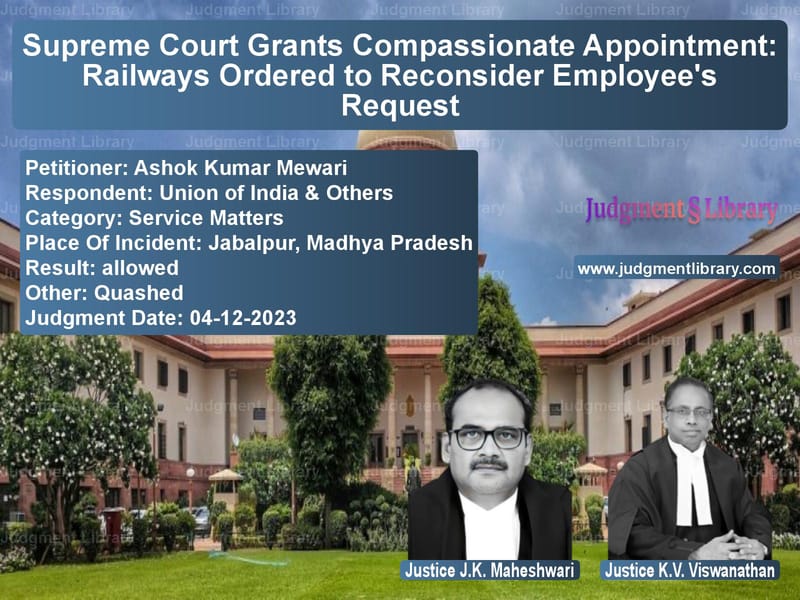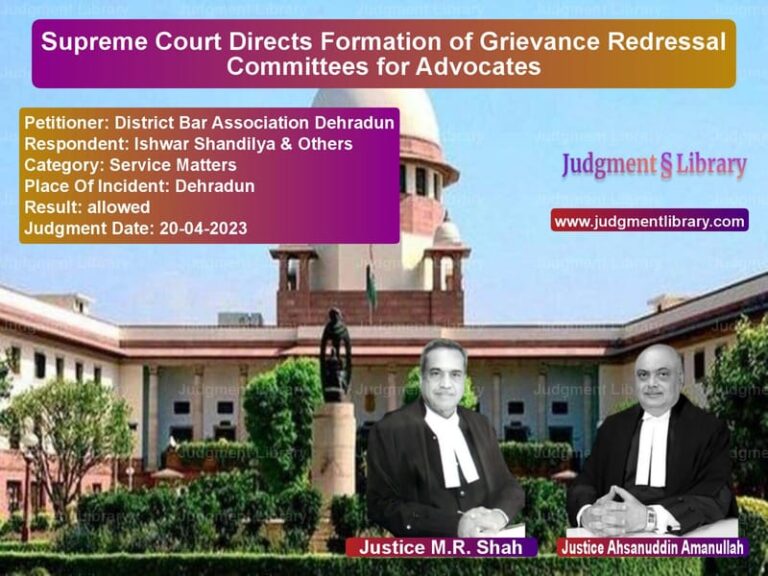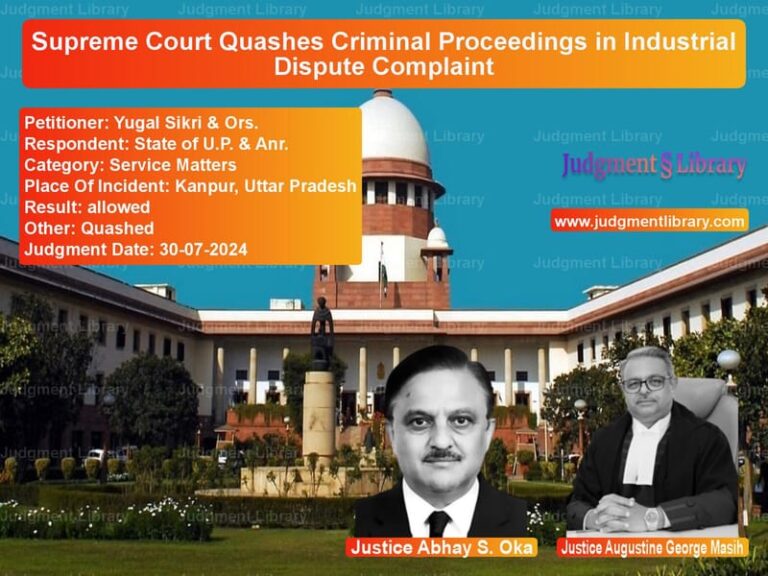Supreme Court Grants Compassionate Appointment: Railways Ordered to Reconsider Employee’s Request
The case of Ashok Kumar Mewari v. Union of India & Others revolves around a crucial issue concerning compassionate appointments in the Indian Railways. The Supreme Court was asked to determine whether an employee’s voluntary retirement request, conditioned upon the compassionate appointment of his son, could be partially accepted by the Railways without considering the compassionate appointment. The Court ruled in favor of the appellant, setting aside previous Tribunal and High Court decisions and directing the Railways to grant compassionate appointment to the employee’s son.
Background of the Case
The appellant, Ashok Kumar Mewari, was an employee of the Railways who sought voluntary retirement on medical grounds. His request, dated June 18, 2013, explicitly stated that he wished to retire only if his son, Mukesh Mewari, was granted compassionate appointment in his place.
The Railway administration, through the Divisional Railway Manager, West Central Railways, Jabalpur, partially accepted the request on September 12, 2013, retiring the appellant but rejecting his request for his son’s appointment.
Dissatisfied with this decision, the appellant filed an application before the Central Administrative Tribunal (CAT), Jabalpur, which ruled in his favor on February 11, 2016, directing the Railways to consider the compassionate appointment of his son.
The Railways, however, challenged the CAT’s order before the Madhya Pradesh High Court, which remanded the matter back to the Tribunal for reconsideration in light of a clarificatory circular dated November 12, 2014. Subsequently, the Tribunal dismissed the appellant’s case on December 18, 2017, and the High Court upheld this dismissal on November 13, 2018.
The appellant then approached the Supreme Court, challenging the decision.
Legal Issues Raised
The Supreme Court had to determine:
- Whether an employee’s request for voluntary retirement, subject to the condition of compassionate appointment for his dependent, could be partially accepted.
- Whether the Railways’ reliance on a clarificatory circular of 2014 was justified when the appellant had applied for retirement in 2013.
- Whether the rejection of the compassionate appointment was legally valid.
Arguments of the Appellant
The appellant’s counsel argued:
- The request for voluntary retirement was conditional and should have been considered along with the request for compassionate appointment.
- The Railway administration erred in partially accepting the request, granting retirement while rejecting compassionate appointment.
- The clarification dated November 12, 2014, was issued after the appellant had already retired and should not have been applied retroactively.
- Precedents, including Food Corporation of India v. Ram Kesh Yadav (2007) 9 SCC 531, support the principle that a conditional retirement request cannot be partially accepted.
Arguments of the Respondents (Railways)
The Additional Solicitor General representing the Railways argued:
- The compassionate appointment scheme is discretionary and does not create an absolute right for the employee’s dependent.
- The 2014 clarification was based on an earlier Railway Board directive from March 3, 2009, which had already set the criteria for medical decategorization.
- The appellant was not “medically decategorized” in a manner that required the Railways to consider his son for appointment.
- Once voluntary retirement was granted, the compassionate appointment request was independent and could be denied based on policy guidelines.
Supreme Court’s Observations
1. Conditional Voluntary Retirement Cannot Be Partially Accepted
The Supreme Court ruled that if an employee makes a conditional retirement request, the employer has only two options:
- Accept the request along with the condition.
- Reject the request in its entirety.
The Court cited Food Corporation of India v. Ram Kesh Yadav, emphasizing that partial acceptance of a conditional offer is legally impermissible:
“An offer must be accepted in full or rejected outright. If the employee explicitly conditions his retirement upon the appointment of his dependent, the employer cannot accept one part and reject the other.”
2. Application of 2014 Clarification Was Unjustified
The Court noted that the appellant’s retirement request was made in June 2013, and the Railway administration accepted his retirement on September 12, 2013. The 2014 clarification was issued after the appellant had already retired and thus could not be applied retrospectively to deny his son’s appointment.
3. No Justification for Rejecting the Compassionate Appointment
The Court found that the Railway Board’s 2006 circular, which governed compassionate appointments for medically decategorized employees, remained in force at the time of the appellant’s retirement. Since the Board had not explicitly excluded cases like the appellant’s, his son’s appointment should have been considered.
Final Judgment
The Supreme Court ruled:
- The orders of the Tribunal (dated December 18, 2017) and the High Court (dated November 13, 2018) were set aside.
- The rejection of the compassionate appointment request (dated November 10, 2023) was quashed.
- The Railways were directed to grant compassionate appointment to Mukesh Mewari within four weeks from the date of the order.
The Court concluded:
“When an employee’s voluntary retirement is conditional upon compassionate appointment of his dependent, the employer must either accept both requests together or reject them outright. The selective acceptance by the Railways was legally untenable.”
Key Takeaways
1. Employers Cannot Partially Accept Conditional Voluntary Retirement Requests
Organizations must either fully accept or reject such requests. Accepting retirement while denying compassionate appointment is unlawful.
2. Policy Changes Cannot Be Applied Retrospectively
Clarifications issued after an employee’s retirement cannot be used to deny benefits retrospectively.
3. Compassionate Appointments Should Be Considered Fairly
If an employee retires with the expectation of dependent appointment, the employer must assess it based on prevailing rules at the time.
Conclusion
The Supreme Court’s ruling reinforces the legal principle that voluntary retirement requests conditioned upon compassionate appointment must be decided in their entirety. The decision upholds employee rights and ensures that policy clarifications do not retroactively disadvantage individuals. This judgment serves as a crucial precedent for future cases involving conditional voluntary retirement and compassionate appointments.
Petitioner Name: Ashok Kumar Mewari.Respondent Name: Union of India & Others.Judgment By: Justice J.K. Maheshwari, Justice K.V. Viswanathan.Place Of Incident: Jabalpur, Madhya Pradesh.Judgment Date: 04-12-2023.
Don’t miss out on the full details! Download the complete judgment in PDF format below and gain valuable insights instantly!
Download Judgment: ashok-kumar-mewari-vs-union-of-india-&-oth-supreme-court-of-india-judgment-dated-04-12-2023.pdf
Directly Download Judgment: Directly download this Judgment
See all petitions in Pension and Gratuity
See all petitions in Public Sector Employees
See all petitions in Termination Cases
See all petitions in Employment Disputes
See all petitions in Judgment by J.K. Maheshwari
See all petitions in Judgment by K.V. Viswanathan
See all petitions in allowed
See all petitions in Quashed
See all petitions in supreme court of India judgments December 2023
See all petitions in 2023 judgments
See all posts in Service Matters Category
See all allowed petitions in Service Matters Category
See all Dismissed petitions in Service Matters Category
See all partially allowed petitions in Service Matters Category







